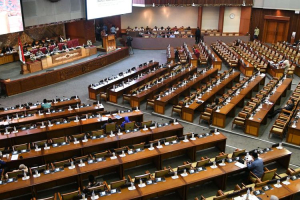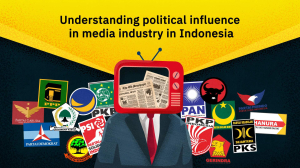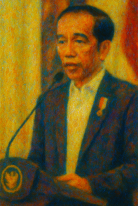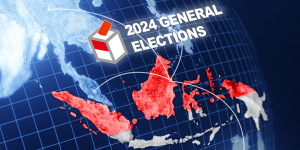Ganjar Pranowo relies on social media for his down-to-earth portrayal campaign
Central Java Governor Ganjar Pranowo has been learning from the best in optimizing the use of social media to garner support for his upcoming presidential candidacy in 2024. His best guru is none other than President Joko "Jokowi" Widodo, who raised to fame and throne thanks to social media.
Ganjar has been using TikTok - a popular Chinese social media platform - and has over 4 million followers. He is also using Instagram with 5 million followers and Twitter with 3 million followers.
The Indonesian Democratic Party of Struggle (PDIP) politician is targeting first-time voters, including students and social media users, with its familiar blusukan (Javanese slang of impromptu visit) and populist campaign strategy to gather support. He tries to impress the people that he’s a down-to-earth Javanese high-ranked official, who is close to commoners.
Gathering electability in digital space
The number of social media users in Indonesia in early 2022 was equivalent to 68.9% of the total population. However, it’s important to note that social media users may not represent unique individuals.
Indonesia has the second largest TikTok users in the world with 99.1 million people, after China. TikTok users in Indonesia spend an average of 23.1 hours on the platform per month. Figures published in ByteDance’s advertising resources indicate that TikTok had 92.07 million users aged 18 and above in Indonesia in early 2022. By July 2022, Indonesia has 106.9 million active TikTok users aged 18 and above.
Meanwhile, there were more than 95 million Instagram users in Indonesia in October 2022, which accounted for 34.9% of its entire population. The figure makes Indonesian Instagram users the fourth largest in the world. People aged 18 to 24 are the largest user group with more than 37 million users.
There were more than 18 million Indonesian Twitter users as of January 2018, making it the 5th largest Twitter user worldwide. Indonesian Facebook users amount to more than 178 million users, with the largest users are of age group of between 18 and 24 years of around 57 million users.
It is obvious that Ganjar is trying to picture himself as a social media darling, especially for first-time voters, with his contents. In Indonesia, young people aged 17 years old and above are entitled to cast their votes in the general elections, which will take place on February 14, 2024.
Appealing to social media mainstream
Ganjar's strategy to appeal to social media mainstream is mostly done through direct communication with students, giving students food for their breakfast and giving speeches in universities. This can be seen in the majority of the posts published on Ganjar’s various social media.
He often talked to students in various universities in Central Java with a similar blusukan approach - which was first popularized by Jokowi when he was in office as a Surakarta mayor. Direct interaction is necessary for Ganjar to solidify his portray as a Central Java governor who is close to his citizens, especially to students.
Following successful strategies
Jokowi has been successful in his direct interaction with the people starting from when he was Surakarta mayor, Jakarta governor and even after becoming Indonesian president. His agenda is full of visit to numerous provinces to meet and talk to the people as well as showcasing his successful infrastructure development agenda.
In Southeast Asia, Jokowi is not the only leader who loves to use social media to gather supports.
Social media also plays an important role for the rise of Philippine President Ferdinand "Bongbong" Marcos Jr. He has been using social media to whitewash history, to give his father Marcos Sr. a “new accolade”. Bongbong used social media campaigns to rebrand the Marcos Sr. era - rather than a period of martial law, horrific human rights violations, corruption, looting of state coffers and economy verging on collapse - to be a golden age; prosperous, crime-free and an age of freedom. He tried to convince the people that overthrowing Marcos Sr. was a mistake because he was able to make a better Philippines.
PDIP's approval is still needed
Ganjar’s current strategy seems to gain some success. He has been named as one of the most popular candidates for the 2024 presidential race, leaning towards moderate nationalists.
The lesser known Indonesian Solidarity Party (PSI) has officially supported Ganjar as a presidential candidate recently. Reports said Ganjar has confirmed that he was already in dialogue with PSI regarding the party's support towards his candidacy.
However, Ganjar has yet to get approval from the PDIP. Instead, the party has reprimanded Ganjar over his recent comment about his readiness to run for president if given the mandate.
Ganjar had said earlier that “as long as it’s for the good of the nation, we’re always ready to take on [this mandate to run for president]”. He was responding to the National Mandate Party (PAN) and United Development Party (PPP), which had previously declared their support for Ganjar.
Tag
Already have an account? Sign In
-
Start reading
Freemium
-
Monthly Subscription
20% OFF$29.75
$37.19/MonthCancel anytime
This offer is open to all new subscribers!
Subscribe now -
Yearly Subscription
33% OFF$228.13
$340.5/YearCancel anytime
This offer is open to all new subscribers!
Subscribe now







